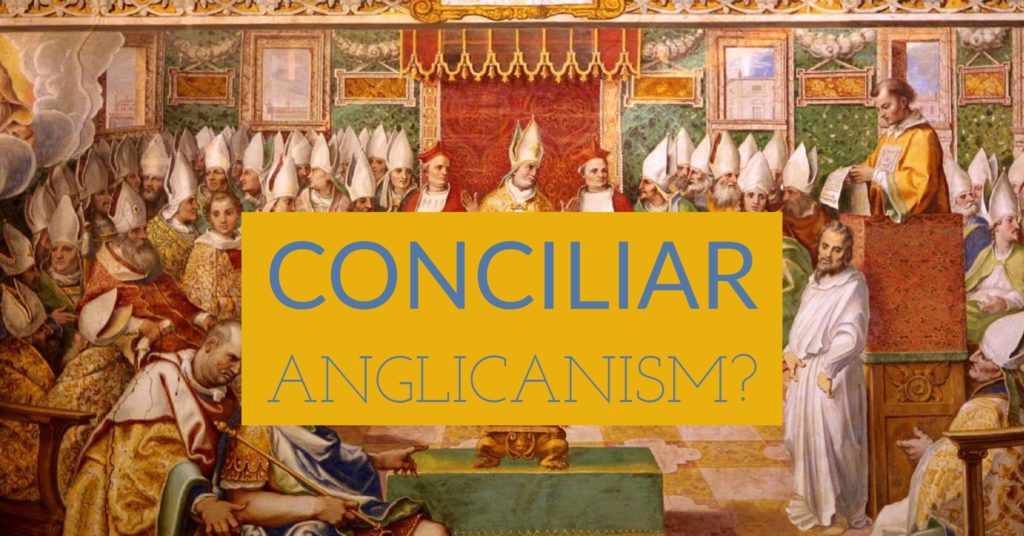by Gerald McDermott
A new book by Phil Ashey proposes a solution to the heresy and division of the Anglican Communion.
Ashey is the Director of the American Anglican Council. He serves as the canon lawyer for the Anglican Church of North America. His Anglican Conciliarism: The Church Meeting to Decide Together argues that the undivided Church of the first millennium established the Christian way of resolving disputes. Starting with the Jerusalem Council in Acts 15, the Church gathered leaders from its biggest regions and made rulings that were binding on all the local churches. They gathered after dialoguing with clergy and laity. The important gatherings were at “ecumenical” (whole world) councils such as Nicaea (325) and Chalcedon (451), where decisions were made about Church belief and practice that shaped the future of Christianity.
The pattern became one of “episcopal leadership and synodical government.” “Episcopal” means leadership by bishops, and “synodical” comes from a Greek word for “traveling together on the way.” The idea was that all parts of the church should give input. The shepherds of the church would resolve disputes over doctrine and practice, “but in partnership and constant dialogue with the clergy and the laity through the synods of the church, and with their consent” (19).
Ashey argues that Anglicans have a distinctive conciliar (from “council”) way of governing that was first used in the early 7th century in the Provinces of Canterbury and York. It holds synods at every level of the Church in order to gain the mind of the whole Church, insists on regular and ongoing councils to ensure ongoing reformation, but also recognizes that councils can and do err (Article XXI in the 39 Articles). It continually looks to Scripture for the Church’s final authority.
In recent Anglican history the problem has been that while synodical government has taken place at most levels of Anglicanism, “classic conciliarism as a governing principle” has “never” been embraced for the whole Church (123). In the Colenso affair in the 1860s, involving questions over biblical criticism and the doctrine of hell, “the Archbishop of Canterbury offered a conference rather than a council” (124). Then in the last few decades as the Communion debated marriage and sexuality, there was more refusal to use the time-honored governance by council: “From the original call for an Anglican Council came a conference, and from a conference consultative ‘instruments,’ and from such instruments a covenant, and finally from a covenant came a committee” (127).
In other words, while the Communion often talked about listening to the Bible and one another, it never used its earlier practice of national and international councils to make Church-wide rulings based on Scripture as understood by the Great Tradition. The Episcopal Church here in the U.S., for example, increasingly used “centralized power” where “property ownership flow[s] from the top down” (143)–rather than synods and councils of the whole Church in consultation with other Provinces in the Communion. Hence, Ashey argues, “TEC is no longer recognizably ‘Anglican’” (145).
But Ashey sees hope in the young Anglican Church of North America (ACNA), where conciliarism “is practiced at all levels of the Church” (145). It declares forthrightly that Scripture is its “rule and ultimate standard,” and tasks its bishops with protecting faith and doctrine.
Ashey clearly hopes, but does not say, that this June’s meeting of GAFCON (Global Anglican Future Conference) in Jerusalem will start the path to a new communion within the Communion that practices orthodox conciliarism from top to bottom. His book is a critical tool for building that new Communion.
This article originally appeared at Patheos.com. Gerald R. McDermott holds the Anglican Chair of Divinity at Beeson Divinity School, and is Distinguished Senior Fellow, Baylor Institute for Studies of Religion; and Fellow, Institute for Theological Inquiry, Jerusalem, Israel. An Anglican priest, he has written, co-authored, or edited eighteen books. His most recent are Famous Stutterers and The New Christian Zionism. You can follow him on Twitter @DrGRMcDermott



